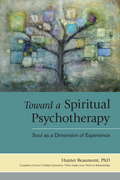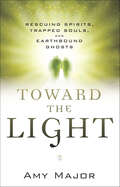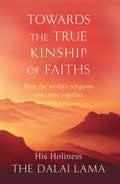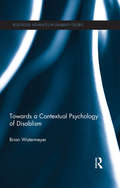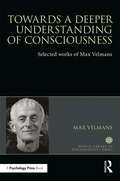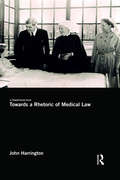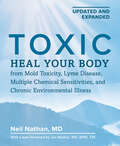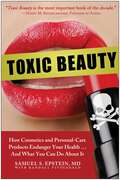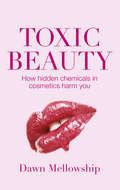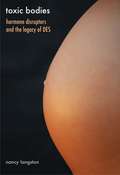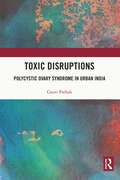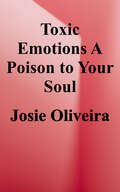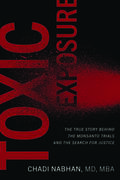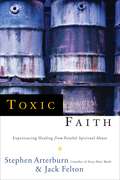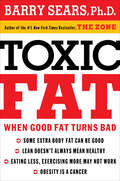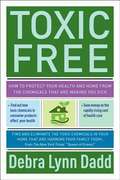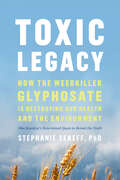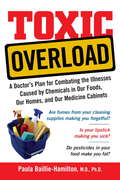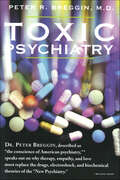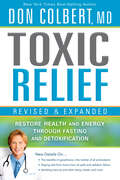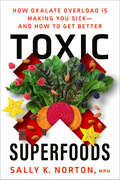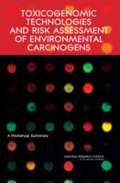- Table View
- List View
Toward a Spiritual Psychotherapy
by Hunter Beaumont John B. CobbToward a Spiritual Psychotherapy collects a series of lectures presented by psychologist Hunter Beaumont over a 10-year period. Covering such themes as relationships, family, healing, grief, mourning, and death, the book features case stories that demonstrate clients' healing experiences. Practicing in Germany for the past 30 years, Hunter Beaumont has had the unique experience of working with World War II and Holocaust survivors and their descendants. Through this work he discovered that healing requires attending to the soul, a process he describes as an "inner 'felt sense' and common, everyday dimension of experience." Demonstrating how therapists can integrate this more spiritual approach into their practices, Beaumont highlights the particular successes of the innovative family constellations therapy. Developed by German psychologist Bert Hellinger and expanded by Beaumont and others, this therapy takes place in a group setting, with group members standing in for family members or others involved in the client's problem. A crucial part of Beaumont's spiritual psychotherapy practice, this method has helped many of his clients release and resolve profound tensions, and offers hope to readers recovering from trauma or PTSD, or simply trying to navigate life's difficulties.From the Trade Paperback edition.
Toward the Light: Rescuing Spirits, Trapped Souls, and Earthbound Ghosts
by Amy MajorStories of ghosts and hauntings have frightened us since the beginning of time. Until recently, few have dared to contact the deceased and discover the true nature of earthbound spirits and the phenomena they create. Our understanding of the afterlife has evolved, and with it the reality that ghosts are just like us, facing many of the same problems we face every day. Spirit rescue mediums are “psychologists for the deceased,” helping them peacefully transition to the other side.Toward the Light is the first guide dedicated solely to spirit rescue and its role in saving earthbound spirits from their self-imposed exile on earth. It is a guide to rescue mediumship, a form of spirit communication used to counsel and aid the deceased in crossing over. It is the first book that will help you understand things from a ghost’s perspective, and will cover such diverse topics as:Why spirits remain earthbound and the emotions associated with this decisionPlaces of interest for earthbound spirits and the reasoning behind their residencyTechniques and tools used by rescue mediumsPsychic protection tools and techniques for all levels of spirit activityThe different vibrational levels of spirit attachmentsResidual energy and the techniques used to clear it away
Towards The True Kinship Of Faiths: How the World's Religions Can Come Together
by His Holiness The Dalai LamaNo country, no culture, no person today is untouched by what happens in the rest of the world, and globalization presents many challenges. The Dalai Lama understands that the essential task of humanity in the twenty-first century must be to cultivate peaceful coexistence. In this book the Dalai Lama shows how in our globalized world, nations, cultures and individuals can find opportunities to connect through their shared human nature. All faiths turn to compassion as a guiding principle for living a good life. It is the responsibility of all people with an aspiration to spiritual perfection to help develop a deep recognition of the value of other faiths, and it is on that basis alone that we can cultivate genuine respect and cooperation.Towards the True Kinship of Faiths is a hopeful yet realistic look at how humanity can embrace a harmonious future.
Towards a Contextual Psychology of Disablism (Routledge Advances in Disability Studies)
by Brian WatermeyerIn recent years, disability studies has been driven by a model of disability which focuses on the social and economic oppression of disabled people. Although an important counterbalance to a pathologising medical model, the social model risks presenting an impoverished and disembodied view of disability, one that ignores the psychological nature of oppression and its effects. This innovative work argues that a psychological framework of disability is an essential part of developing a more cohesive disability movement. Brian Watermeyer introduces a new, integrative approach, using psychoanalysis to tackle the problem of conceptualising psychological aspects of life with disablism. Psychoanalytic ideas are applied to social responses to impairment, making sense of discrimination in its many forms, as well as problems in disability politics and research. The perspective explores individual psychological experience, whilst retaining a rigorous critique of social forces of oppression. The argument shows how it is possible to theorise the psychological processes and impressions of discriminatory society without pathologising disadvantaged individuals. Drawing on sociology, social anthropology, psychology and psychoanalysis - as well as clinical material - Towards a Contextual Psychology of Disablism shapes a view of disabled subjectivity which is embodied, internal, and political. Presenting a range of conceptual ideas which describe psychological dynamics and predicaments confronting disabled people in an exclusionary and prejudiced world, this volume is an important new contribution to the literature. It will interest students and researchers of disability studies, including those working within psychology, education, health and social work.
Towards a Deeper Understanding of Consciousness: Selected works of Max Velmans (World Library of Psychologists)
by Max VelmansIn the World Library of Psychologists series, international experts themselves present career-long collections of what they judge to be their finest pieces - extracts from books, key articles, salient research findings, and their major practical theoretical contributions. In this volume Max Velmans reflects on his long-spanning and varied career, considers the highs and lows in a brand new introduction and offers reactions to those who have responded to his published work over the years. This book offers a unique and compelling collection of the best publications in consciousness studies from one of the few psychologists to treat the topic systematically and seriously. Velmans’ approach is multi-faceted and represents a convergence of numerous fields of study – culminating in fascinating insights that are of interest to philosopher, psychologist and neuroscientist alike. With continuing contemporary relevance, and significant historical impact, this collection of works is an essential resource for all those engaged or interested in the field of consciousness studies and the philosophy of the mind.
Towards a Rhetoric of Medical Law: Against Ethics
by John HarringtonChallenging the dominant account of medical law as normatively and conceptually subordinate to medical or bioethics, this book provides an innovative account of medical law as a rhetorical practice. The aspiration to provide a firm grounding for medical law in ethical principle has not yet been realized. Rather, legal doctrine is marked, if anything, by increasingly evident contradiction and indeterminacy that are symptomatic of the inherently contingent nature of legal argumentation. Against the idea of a timeless, placeless ethics as the master discipline for medical law, this book demonstrates how judicial and academic reasoning seek to manage this contingency, through the deployment of rhetorical strategies, persuasive to concrete audiences within specific historical, cultural and political contexts. Informed by social and legal theory, cultural history and literary criticism, John Harrington’s careful reading of key judicial decisions, legislative proposals and academic interventions offers an original, and significant, understanding of medical law.
Toxemia Explained
by J. H. TildenWHAT more can be asked by any doctor or layman than a philosophy of the cause of disease that gives a perfect understanding of all the so-called diseases? To know cause supplies even the layman with a dependable knowledge of how to avoid building disease, and how to cure. When people know how to avoid disease they know an immunization that immunizes rationally. Dependable knowledge of what disease really is and its cause is man's salvation; and when it can be had with no more effort than that required to read carefully and understandingly Toxemia Explained, there is little excuse for anyone, lay or professional, to live in ignorance of it. Knowledge is power. Knowledge of how to have health gives greatest power. Few people know anything about the cause of disease. To them this book is dedicated and the freedom from medical superstition it will bring them.
Toxic 2nd Edition: Heal Your Body from Mold Toxicity, Lyme Disease, Multiple Chemical Sensitivities, and Chronic Environmental Illness
by Neil NathanDr. Neil Nathan introduces fresh insights, updated information, and vital medical breakthroughs in this second edition of his bestselling book.Millions of people are suffering from chronic illnesses that, unbeknownst to them, are the result of exposure to environmental toxins and infectious agents such as mold and Borrelia, which causes Lyme disease. Millions. Because the symptoms of these illnesses are so varied and unusual, many of these individuals have sought medical care only to be dismissed, as if what they are experiencing is &“in their head.&” Many (if not most) have tried to tough it out and continue to function without hope of improvement. Unfortunately, their illnesses are very real. The new edition of Toxic offers renewed hope for patients, their loved ones, and the physicians who care for them. Dr. Neil Nathan delves deeper into the harmful impact of chronic inflammation in driving disease and presents the latest information that can help both doctors and patients achieve faster and more complete healing. He has also expanded the chapter on mold toxicity, as it is increasingly recognized as a leading cause of complex illnesses.Drawing on decades of experience helping thousands of patients regain their health, even when other doctors had lost hope, Dr. Nathan continues to refine his understanding of the common causes of debilitating illnesses, leading to more precise and effective treatments. This updated edition sheds even more light on these complex conditions, offering patients and their families the crucial support they need.Key updates include:· The latest testing and treatments in every chapter· Major medical breakthroughs in the identification and treatment of Lyme disease· An expanded section on the diagnosis and treatment of mold toxicity· A dedicated chapter on COVID-19· A comprehensive chapter on the health effects of electromagnetic fields (EMFs)· A full chapter on new discoveries related to environmental toxinsReaders will have access to the comprehensive range of topics explored in the original edition, including:· Information about how extreme sensitivity and toxicity develop in the body, how sensitivity and toxicity differ, and how they often overlap· Detailed descriptions of each of the five major causes of extreme sensitivity and toxicity: mold, Bartonella (a co-infection of Lyme disease), mast cell activation, porphyria, and carbon monoxide poisoning· An outline of the cell danger response, a revolutionary model developed by Dr. Robert Naviaux that explains how the body essentially gets "stuck" fighting a threat even after the danger has passed· A system-by-system plan for "rebooting" the body to break the cycle of illness and allow healing to begin· Information about coping with stress and embracing an emotional and/or spiritual awakening on the path to wellness
Toxic Beauty: How Cosmetics and Personal-Care Products Endanger Your Health... and What You Can Do About It
by Samuel S. EpsteinSplashy ads and commercials for personal care products are everywhere we turn, promising to keep our appearances fresh and our partners satisfied. But do consumers really know what they're applying to their faces and bodies in their quests for youth and beauty? Do they know the health risks they're taking by simply applying lipstick, face moisturizer or deodorant? Toxic cosmetics and personal care products clutter the shelves at retail stores everywhere, and consumers don't know the avoidable risks they're taking by following a simple beauty regimen. Written by Dr. Samuel S. Epstein, a founder and chairperson of the Cancer Prevention Coalition, Toxic Beauty gives the lowdown on salon safety, health risks hiding in everyday products, how we put our children in danger and more. Toxic Beauty will also educate you and your family on easily implemented solutions through the use of a variety of positive alternatives. Through the help of Dr. Epstein and Toxic Beauty, you can protect yourself from the possible long-term effects of a simple beauty product.
Toxic Beauty: The hidden chemicals in cosmetics and how they can harm us
by Dawn MellowshipEvery year we each absorb an estimated 2 kilograms of chemicals through beauty and cosmetic products. Chemicals found in lipsticks, skin lotions and hair dyes have been linked with tumours, cell mutation, allergies, reproductive complications, endocrine disruption and cancer. Isn't it time we all paid more attention to exactly what goes into the eye shadows, body washes and deodorants we love to use? This compelling and timely book tells you the key chemicals you should avoid, reveals just how natural 'organic' beauty products really are, and features a directory highlighting the health issues surrounding a wide range of products, from hair gel to sunscreens.
Toxic Beauty: The hidden chemicals in cosmetics and how they can harm us
by Dawn MellowshipEvery year we each absorb an estimated 2 kilograms of chemicals through beauty and cosmetic products. Chemicals found in lipsticks, skin lotions and hair dyes have been linked with tumours, cell mutation, allergies, reproductive complications, endocrine disruption and cancer. Isn't it time we all paid more attention to exactly what goes into the eye shadows, body washes and deodorants we love to use? This compelling and timely book tells you the key chemicals you should avoid, reveals just how natural 'organic' beauty products really are, and features a directory highlighting the health issues surrounding a wide range of products, from hair gel to sunscreens.
Toxic Bodies: Hormone Disruptors and the Legacy of DES
by Nancy LangstonIn 1941 the Food and Drug Administration approved the use of diethylstilbestrol (DES), the first synthetic chemical to be marketed as an estrogen and one of the first to be identified as a hormone disruptor--a chemical that mimics hormones. Although researchers knew that DES caused cancer and disrupted sexual development, doctors prescribed it for millions of women, initially for menopause and then for miscarriage, while farmers gave cattle the hormone to promote rapid weight gain. Its residues, and those of other chemicals, in the American food supply are changing the internal ecosystems of human, livestock, and wildlife bodies in increasingly troubling ways. In this gripping exploration, Nancy Langston shows how these chemicals have penetrated into every aspect of our bodies and ecosystems, yet the U. S. government has largely failed to regulate them and has skillfully manipulated scientific uncertainty to delay regulation. Personally affected by endocrine disruptors, Langston argues that the FDA needs to institute proper regulation of these commonly produced synthetic chemicals.
Toxic Disruptions: Polycystic Ovary Syndrome in Urban India
by Gauri S. PathakThis book provides a unique ethnographic account of women living with polycystic ovary syndrome (PCOS) in India. It examines how contaminated environments and political–economic changes render urban middle-class women in India vulnerable to PCOS, a condition which has the potential to disrupt conventional, normative feminine biographies of marriage and childbearing. The volume revolves around two main themes: how toxic landscapes, the endocrine disrupting chemicals suffusing them, and the political–economic environments related to them are linked to endocrine disorders such as PCOS; and how the biosocial disruptions caused by PCOS are both affecting women and reflective of changes in contemporary urban India. The author draws on anthropological fieldwork to investigate these connections through a fresh approach, combining a political ecological framework with perspectives from the anthropology of toxic exposures and health–environment systems. The first of its kind, this volume will be indispensable to students and researchers of anthropology, particularly medical anthropology, medical sociology, human geography, science and technology studies, medical humanities, health–environment systems, endocrine disorders, public health, and South Asian studies.
Toxic Emotions: A Poison to Your Soul
by Josie OliveiraToxic emotions damage our physical and emotional health and generate vicious thinking which affects our communication, behavior, relationships and decisions. They also influence our self-image and self-esteem. Emotions and feelings are interconnected, since we are generating a feeling that can impact us in a positive or negative way, respecting the moment we allow an emotion to enter through our thoughts. <p><p>In this book the author explains how we can be freed from toxic emotions, through valuable techniques and relevant tips, in order to live an abundantly joyful and purposeful life.
Toxic Exposure: The True Story behind the Monsanto Trials and the Search for Justice
by Chadi NabhanA behind-the-scenes look inside three key trials involving Monsanto's weed killer Roundup, cancer, and the search for justice—written by an expert witness medical oncologist who lived it all.For years, Monsanto declared that their product Roundup, the world's most widely used weed killer, was safe. But that all changed in 2015, when the International Agency for Research on Cancer (IARC) analyzed data from scientific studies and concluded that glyphosate, the active ingredient in Roundup, is probably carcinogenic. The Environmental Protection Agency (EPA) disagreed, other regulatory agencies got involved, and scientists clamored to understand the link between glyphosate and cancer.Toxic Exposure tells the true story of numerous patients who developed non-Hodgkin lymphoma, a form of cancer, after using Roundup and their ensuing trials against Monsanto (now owned by Bayer, one of the largest agrochemical companies in the world). Written by Chadi Nabhan, MD, MBA, a cancer specialist, this is the only book written by an expert physician witness who testified in the first three trials against Monsanto.Dr. Nabhan takes the reader behind the scenes of these pivotal trials, explaining key features of the cases, including how Monsanto downplayed the IARC's scientific conclusions, may have worked to change how the EPA classified glyphosate, and conducted extensive PR campaigns designed to minimize the public's perception of the negative health effects of its product. He also provides details about the other expert witnesses who reviewed the evidence, analyzed the science, and stood up to this agricultural behemoth in the courtroom. Dr. Nabhan tells the inside story of corporate influence, courtroom drama, legal discourse, monumental verdicts, and the ensuing media frenzy surrounding this massive uncovering of the truth and the years of scientific and legal work that led up to it.
Toxic Faith: Experiencing Healing Over Painful Spiritual Abuse
by Stephen Arterburn Jack FeltonWhen religion becomes a means to avoid or control life, it becomes toxic. Those who possess a toxic faith have stepped across the line from a balanced perspective of God to an unbalanced faith in a weak, powerless or uncaring God. They seek a God to fix every mess, prevent every hurt, and mend every conflict.<P> Toxic Faith distinguishes between a healthy faith and a misguided religiosity that traps believers in an addictive practice of religion. It shows how unbalanced ministries, misguided churches, and unscrupulous leaders can lead their followers away from God and into a desolate experience of religion that drives many to despair. Toxic Faith shows readers how to find hope for a return to genuine, healthy faith that can add meaning to life. In the words of the author, "I want to help you throw out that toxic faith and bring you back to the real thing."From the Trade Paperback edition.
Toxic Fat
by Barry SearsToxic Fat: When Good Fat Turns Bad, provides a revolutionary new understanding of our current obesity epidemic by showing that it can be viewed as a form of cancer to be treated using the clinically proven pathway to change the expression of your genes using food as a drug to rid your body of toxic fat. For many of us, one of the first signs of toxic fat is the accumulation of excess body fat. In fact, obesity can be viewed as a form of "cancer" that is driven by toxic fat. However, only when this toxic fat begins to spread into the bloodstream does it begin to attack your other organs leading to early development of chronic disease. This is why some people can be overweight and be quite healthy, while others can be of normal weight and be quite sick. What ultimately determines your state of wellness is not your weight but the levels of toxic fat in your blood. This book changes forever how we look at the fat on our body and its impact on the future of health care in America.
Toxic Free
by Dadd Debra LynnFrom the The New York Times'"Queen of Green" comes the ultimate guide for finding and eliminating the toxic chemicals in your home today. There is no longer any question that consumer products contain toxic chemicals harmful to our families. But how do we protect ourselves, and where do we start? In Toxic Free, Debra Lynn Dadd, hailed by The New York Times as the "Queen of Green," discusses the hidden toxic chemicals already present in our homes, their varying degrees of danger, and precise, proven methods for eliminating them from our lives in a cost- effective, environmentally friendly way. Are you suffering from unexplained headaches, fatigue, or depression? Are you worried about the link between chemicals in the home and the rising rate of cancer? Or are you just looking to save money (and the planet in the process)? From tips and do-it-yourself formulas to world-class research and in-depth exploration and explanation, this book provides: a basic understanding of how toxic chemicals in consumer products affect your health; all the tools you need to remove these toxins from your home and body- starting today; and helpful guides on how to immediately save money on home-care products, as well as on the rapidly rising cost of your health care. .
Toxic Legacy: How the Weedkiller Glyphosate Is Destroying Our Health and the Environment
by Stephanie SeneffNamed a &“Best Book of the Year&” by Kirkus Reviews&“Urgent and eye-opening, the book serves as a loud-and-clear alarm.&”―The Boston GlobeNamed an &“Outstanding Academic Title&” by Choice From an MIT scientist, mounting evidence that the active ingredient in the world&’s most commonly used weedkiller is contributing to skyrocketing rates of chronic disease.Glyphosate is the active ingredient in Roundup, the most commonly used weedkiller in the world. Over 300 million pounds of glyphosate-based herbicide are sprayed on farms―and food―every year.Agrochemical companies claim that glyphosate is safe for humans, animals, and the environment. But emerging scientific research on glyphosate&’s deadly disruption of the gut microbiome, its crippling effect on protein synthesis, and its impact on the body&’s ability to use and transport sulfur―not to mention several landmark legal cases―tells a very different story.In Toxic Legacy, senior research scientist Stephanie Seneff, PhD, delivers compelling evidence based on countless published, peer-reviewed studies―all in frank, illuminating, and always accessible language.As Rachel Carson did with DDT in the 1960&’s with Silent Spring, Seneff sounds the alarm on glyphosate, giving you guidance on simple changes you can make right now and essential information you need to protect your health, your family&’s health, and the planet on which we all depend.&“A game-changer that we would be foolish to ignore.&”―Kirkus Reviews (starred)&“Toxic Legacy will stand shoulder to shoulder with Rachel Carson&’s Silent Spring. [This is] unquestionably, one of the most important books of our time.&”―David Perlmutter, MD, #1 New York Times bestselling author of Grain Brain&“Dr. Seneff&’s work will change the way we all think about food.&”―Mark Hyman, MD, New York Times bestselling author
Toxic Overload: A Doctor's Plan for Combating the Illnesses Caused by Chemicals in Our Foods, Our Homes, and Our Medicine Cabinets
by Paula Baillie-HamiltonAre fumes from your cleaning supplies making you forgetful? Is your lipstick making you sick? Do pesticides in your food make you fat?<P> "Whether you currently have an illness that you wish to treat, are looking to optimize your existing health, or simply want to lower your changes of becoming ill in the future, this book is designed to help you achieve your health goals." --from the introduction.
Toxic Psychiatry: Why Therapy, Empathy And Love Must Replace The Drugs, Electroshock, And Biochemical Theories Of The New Psychiatry
by Peter R. BregginProzac, Xanax, Halcion, Haldol, Lithium. These psychiatric drugs--and dozens of other short-term "solutions"--are being prescribed by doctors across the country as a quick antidote to depression, panic disorder, obsessive-compulsive disorder, and other psychiatric problems. But at what cost?In this searing, myth-shattering exposé, psychiatrist Peter R. Breggin, M.D., breaks through the hype and false promises surrounding the "New Psychiatry" and shows how dangerous, even potentially brain-damaging, many of its drugs and treatments are. He asserts that: psychiatric drugs are spreading an epidemic of long-term brain damage; mental "illnesses" like schizophrenia, depression, and anxiety disorder have never been proven to be genetic or even physical in origin, but are under the jurisdiction of medical doctors; millions of schoolchildren, housewives, elderly people, and others are labeled with medical diagnoses and treated with authoritarian interventions, rather than being patiently listened to, understood, and helped.Toxic Psychiatry sounds a passionate, much-needed wake-up call for everyone who plays a part, active or passive, in America's ever-increasing dependence on harmful psychiatric drugs.
Toxic Relief, Revised and Expanded: Restore Health and Energy Through Fasting and Detoxification
by Don ColbertWe live in a toxic world. And with new disasters--oil spills, earthquakes, tsunamis, and radioactivity--it is only getting more toxic by the day. You need toxic relief! In this new revised and expanded edition of Toxic Relief, Dr. Don Colbert provides an easy-to-understand and comprehensive explanation of the toxic battle you’re in and a proven program to cleanse your body in just thirty days. Learn about dangerous foods to avoid and healthy substitutions you can make. Detoxify your body with a rotational juice fasting program. Overcome fatigue! Learn how to find the right foods and supplements. Explore the spiritual and physical aspects of fasting. Find out why saunas and exfoliating detox your body. Deep cleansing your body down to the cellular level will renew your vitality, restore your energy, reclaim your health, shed toxic fat, lengthen your life, and give you a healthy glow you haven’t had in years. Brighten your outlook and change your attitude as Dr. Colbert guides you to healthy living--body, mind, and spirit.
Toxic Superfoods: How Oxalate Overload Is Making You Sick--and How to Get Better
by Sally K. NortonAn acclaimed nutrition educator reveals how the foods you&’re eating to get healthy might be making you sick. &“Sally Norton&’s well-researched book makes a truly important contribution to the literature in revealing just how much oxalates can damage the human body.&”—Nina Teicholz, author of The Big Fat Surprise If you&’re eating a healthy diet and you&’re still dealing with fatigue, inflammation, anxiety, recurrent injuries, or chronic pain, the problem could be your spinach, almonds, sweet potatoes, and other trusted plant foods. And your key to vibrant health may be quitting these so-called superfoods. After suffering for decades from chronic health problems, nutrition educator Sally K. Norton, MPH, discovered that the culprits were the chemical toxins called oxalates lurking within her &“healthy,&” organic plant-heavy diet. She shines light on how our modern diets are overloaded with oxalates and offers fresh solutions including: • A complete, research-backed program to safely reverse your oxalate load • Comprehensive charts and resources on foods to avoid and better alternatives • Guidance to improve your energy, optimize mood and brain performance, and find true relief from chronic pain In this groundbreaking guide, Norton reveals that the popular dictum to &“eat more plants&” can be misleading. Toxic Superfoods gives health-seekers a chance for improved energy, optimum brain performance, graceful aging, and true relief from chronic pain.
Toxic Torts
by Carl F. CranorThe relationship between science, law and justice has become a pressing issue with US Supreme Court decisions beginning with Daubert v. Merrell-Dow Pharmaceutical. How courts review scientific testimony and its foundation before trial can substantially affect the possibility of justice for persons wrongfully injured by exposure to toxic substances. If courts do not review scientific testimony, they will deny one of the parties the possibility of justice. Even if courts review evidence well, the fact and perception of greater judicial scrutiny increases litigation costs and attorney screening of clients. Mistaken review of scientific evidence can decrease citizen access to the law, increase unfortunate incentives for firms not to test their products, lower deterrence for wrongful conduct and harmful products, and decrease the possibility of justice for citizens injured by toxic substances. This book introduces these issues, reveals the relationships that pose problems, and shows how justice can be denied.
Toxicogenomic Technologies and Risk Assessment of Environmental Carcinogens: A Workshop Summary
by National Research CouncilToxicogenomics is a discipline that combines expertise in toxicology, genetics, molecular biology, and environmental health to help understand the response of living organisms to stressful environments. The National Research Council convened a workshop to discuss how toxicogenomic data could be applied to improve risk assessments, particularly cancer risk from environmental exposure to chemicals. Risk assessments serve as the basis of many public-health decisions in environmental, occupational, and consumer protection from chemicals. The workshop provided a forum for communities of experts, including those working in "-omics" and those in the policy arena, to discuss where their fields intersect, and how toxicogenomics could address critical knowledge gaps in risk assessments.
